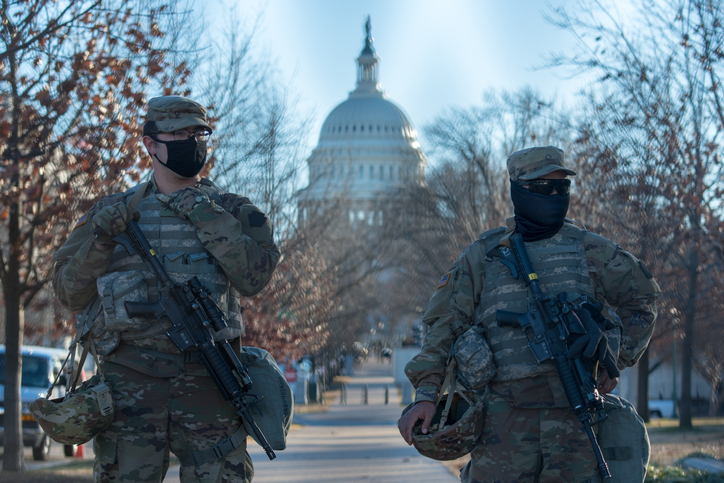Tarso Ramos is a researcher, writer, and activist who has studied authoritarian and white supremacist movements for more than 25 years. Currently, Ramos is the executive director of Political Research Associates, a social justice think tank supporting movements “building a more just and inclusive democratic society.” As a child, Ramos’s family fled Brazil after a U.S.-backed military coup. They ended up in the United States, and Ramos has dedicated his career to researching and fighting authoritarian political movements here. In this interview, which has been edited and condensed, Ramos breaks down the basics behind the white supremacist movements that fueled the insurrection at the Capitol: who they are, how they’re organized, how they’re funded, and what we need to do to dismantle them.
-Nelson Soza
What is white supremacy, and what’s the relationship between the organized, violent white groups, like the ones we saw that stormed the Capitol, and more mainstream conservatives?
White supremacy is a system of political, cultural, and economic power that oppresses and exploits groups labeled as racial inferiors. The United States was founded as an explicitly white male supremacist colonial settler project. White nationalism is, historically speaking, the complimentary ideology that sees white Christian European colonizers and their descendants as the true American people — the nation — whose western culture is responsible for all that is great about the U.S. Maybe most important for this conversation, white nationalism today is a social movement animated by these beliefs.
For white nationalists, the government and leading institutions of the United States are no longer racist enough to ensure the continued cultural, economic, and political dominance of white Americans. In particular, white supremacy is failing to deliver sufficient material and status benefits to non-elite whites or to keep whites from becoming a numerical minority — which they view as imminent white genocide. There is some diversity of opinion as to when, exactly, things went so horribly wrong: was it the Emancipation Proclamation? Post-Civil War constitutional amendments? Brown v. Board of Education? But the mid-1960s passage of civil and voting rights legislation, revamping of racist immigrations policies, and racial desegregation were key turning points. Those changes animated a white nationalist movement that today demands a new social contract. They are less focused on economic exploitation of people of color than on creating a whites-only society.
To your question, white nationalists view the white supremacist systems defended by mainstream conservatives — racist policing, mass incarceration, voter disenfranchisement, privatization of services, and whatnot — as weak stuff, and self-serving for elites. They have adopted an insurrectionist, anti-government posture. To the extent that they support Trump (and many of the explicit white power groups gave up on him a while ago), it’s largely tactical — he has mainstreamed their ideas and policy goals, like Pat Buchanan did for David Duke not so long ago.
The attempt to block certification on January 6th of course involved scores of elected officials as well as those who stormed the building. This development — and Mitch McConnell’s failure to sever the GOP from Trump after the insurrection — underscores the danger that white nationalism could become baked into the Republican Party. These people chose racist authoritarianism over the possibility of multiracial democracy.
However, the insurrectionist crowd on January 6th was much broader than ideological white nationalists, bringing together racist vigilantes and paramilitaries like Proud Boys and Oath Keepers with Qanon conspiracists, Christian nationalists mobilized by Jericho March, anti-abortion activists, police and military personnel, among others. Lots of business owners and professionals among them.
The scale of this emergent far right coalition is much larger than what we saw during the early Obama administration with the Tea Party phenomenon. And while they don’t all believe exactly the same things, they’ve unified around a far more authoritarian objective than in the past: cancel a presidential election.
How does the white nationalist movement organize? Who gives them money?
They make very effective use of social media for recruitment and organizing. It’s possible for people to live in an alternative information reality. Much of the mass organizing happens in these virtual spaces. Misogyny and sexism play huge roles. Just as Mitch McConnell has been a grave digger of democracy by enabling Trump’s policies and stacking the courts with anti-democratic judges, some media companies are also culpable. Facebook and Twitter have been getting rich on white supremacy and Christian nationalism. We have to think about these companies as culpable for the erosion of democracy.
How does white supremacy relate to class?
The logic presented to white middle- and working-class people is that they’re being squeezed by elites at the top and dark-skinned parasites at the bottom. It’s a race and class narrative brought together, and with a heavy dose of patriarchy
The building blocks of authoritarianism in this country, as around the world, include severe economic inequality (through neoliberal or other austerity economics), racial and ethnic nationalism, and religious nationalism or theocracy. These forces work hand in hand. We are seeing a rise of nationalism and authoritarianism all over the world, from Milan to Manila, Berlin to Brasilia, and Warsaw to Washington.
It’s been women’s movements at the forefront of fighting back, and that’s true here in the U.S. We see women-led movements blocking authoritarianism and building multiracial, feminist democracy.
Does the violence that the white supremacy movement has shown have anything to do with economic inequalities that white workers also face?
The rhetoric of authoritarianism, of white supremacy, asserts that there is a crisis of legitimacy of the political and the economic system. Liberal political parties and initiatives have tried to assert that things are more or less working; we just have to make the economy a little bit fairer and society a little more inclusive. But nobody believes that. There has to be recognition that there’s an actual crisis of legitimacy. You cannot fight authoritarianism with the status quo. Authoritarian movements thrive in conditions where the status quo is not working for many people.
Let’s also recognize that we are in a particular moment in the history of the United States where white people will soon no longer be a majority of the population. This is creating fear and opportunity for white nationalists to mobilize within a general population of white people who feel very nervous about the prospect of no longer being in the majority.
This is a very fragile moment. With this sort of demographic transition, there predictably comes an attempt to mobilize the dominant racial, religious, or cultural groups to preserve their dominance. In the United States, that would require white minority rule. That’s really the question we are facing. Are we going to have a more theocratic, more corporate dominated, more explicitly white supremacist society — or are we going to have real emancipatory multiracial, feminist, religiously plural democracy? And January 6th offered a frightening potential answer. A frightening answer that, at this inflection point, tens of millions of people in this country support an option that isn’t democracy.
Where should we concentrate our organizing efforts? Are there policies we should be moving forward?
At PRA we tend to think in terms of blocking and building. We have to block the further consolidation of power by the far right and anti-democratic forces. And we have to build the infrastructure for real emancipatory, feminist, multiracial, religiously plural democracy. Georgia, Arizona, and Philadelphia gave proof of concept that Black and brown-led multiracial organizing with strong, but not solely, electoral goals aligned with community power-building can deliver a democratic future. These efforts denied a second term to white nationalism. They related to but were not controlled by political parties. We need more of that kind of infrastructure. Too often, when Democrats are elected President, resources are withdrawn from field and community-accountable infrastructure building and diverted for policy work.
Building that forward-facing infrastructure will be critical. The far right sees a path back to power. The margin of difference in the Senate couldn’t be narrower. And the right gained power in the House of Representatives. While Trump was ultimately denied a second term, the anti-democratic forces gained power in down ticket races. The number of states controlled by a Trumpist Republican Party has huge implications for redistricting. For far-right forces who feel locked out of federal power at this point, there are two options. Some will shift from the ballot box to the cartridge box. Others will advance their agendas in the states and municipalities. And wherever possible, they will seek to block the capacity of the new administration to govern.
It is critical that we have some dramatic policy wins at the federal level in these first two years. We have to demonstrate that we’re serious about building a transformed democratic society in which the vast majority of people will be better off, including a plurality of white people, who we need to opt for multiracial democracy rather than white supremacy. A centrist administration like Biden/Harris isn’t going to build the democratic future we want. But we must wrest enough benefit from it to have a compelling case for democracy over authoritarianism. We have to think about two years and four years, but we also have to think about twenty years and 25 years. We’re in a generation-long fight for democratic possibility.
Anything you would like to stress as we bring this conversation to a close?
I want to emphasize that we are at a moment where the balance of forces is very precarious. There’s an enormous threat that the centrist response to the rise of white nationalism won’t be building the infrastructure for multiracial democracy but building up the national security policing state. It would be a way of looking like they’re dealing with white supremacy but with interventions that are only going to come back around to attack Black and brown communities and religious minorities, including Muslims.
We have to take white nationalism more seriously. We have to develop new strategies that don’t treat it like a counterinsurgency problem of extremism or trivialize it as a problem of “hate.” It’s a problem of power. It’s a contest for power. We need new vocabulary and paradigms for fighting it effectively. And we’ll do that, we’ll do that together.


